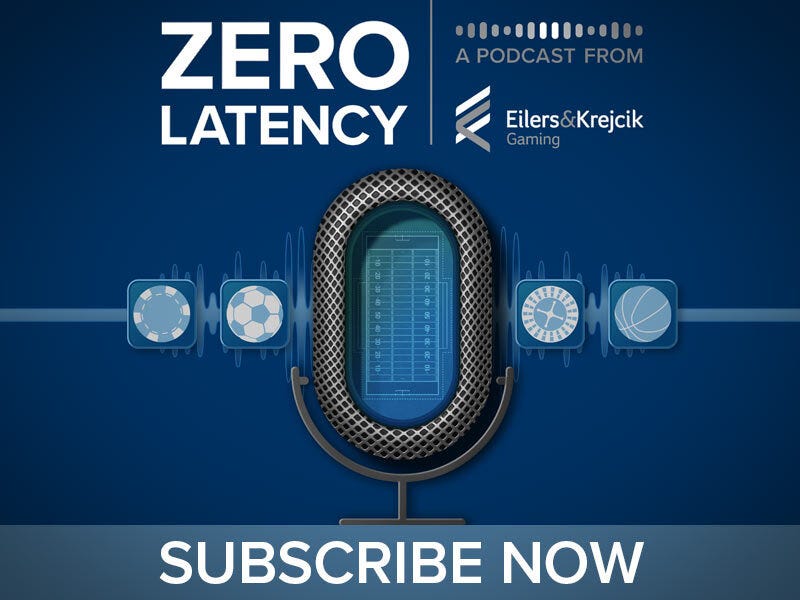2024 Ushers In Huge Changes
The gambling industry underwent a seismic shift in 2024. I recap the year that was with my picks for the five biggest stories of 2024.
The Bulletin Board
THE LEDE: Straight to the Point’s five biggest stories of 2024.
MIDWEEK ROUNDUP: OK lawmaker prefiles sports betting bill; Interstate online poker coming soon to PA?
NEWS: Three pieces of Nevada news.
VIEWS: Four suggestions that can make poker great again.
AROUND the WATERCOOLER: The changed media landscape.
STRAY THOUGHTS: Happy New Year!
SPONSOR’S MESSAGE - Sporttrade was borne out of the belief that the golden age of sports betting has yet to come. Combining proprietary technology, thoughtful design, and capital markets expertise, our platform endeavors to modernize sports betting for a more equitable, responsible, and accessible future.
Sporttrade is now live in their fifth state; Virginia
The Lede: The Five Biggest Stories of 2024
2024 was a significant year for legal, regulated gambling. Below are the five stories I have selected as the most significant in terms of their immediate and future impact.
In tomorrow’s newsletter, I look at five six more stories that were big news in 2024 and will continue to be big news in 2025.
Election Betting and the Rise of Prediction Markets
Kalshi’s triumph over the Commodities and Futures Trade Commission (CFTC) led to legal political prediction markets. It also sparked a wave of new prediction products, including Crypto.com's recent launch of its 50-state sports betting product.
Of course, the CFTC is appealing the court’s ruling, and members of the House and Senate have introduced legislation to prohibit election betting markets.
More from STTP on election betting:
Scandals, Get Your Scandals Here
Legalization has been a cleansing agent for sports betting. Still, in the court of public opinion, the regulated industry is squarely blamed for every misdeed, including Johntay Porter, Ohtani-Mizuhara, Temple Basketball, and player harassment.
The industry can (rightfully) scream that regulation uncovered or highlighted these existing problems, but decision-makers don’t seem to care.
DFS 2.0 Gets Overshadowed by Sweepstakes
A year ago, the legality of DFS 2.0 sites was the industry’s big unanswered question. During 2024, DFS 2.0 was pushed to the back burner, with sweepstakes supplanting them as the “this is obviously illegal (or is it?)” topic du jour.
More from STTP on sweepstakes:
The West Flagler Decision and the Shifting Tribal Landscape
It seems like a lifetime ago, but it has only been six months since the Supreme Court declined to hear the West Flagler case. The SCOTUS decision effectively validated Florida’s hub-and-spoke mobile sports betting model and set the stage for other tribal gaming states to follow suit.
Tribes had a very busy year. In addition to West Flagler, there were the revised Department of Interior Bureau of Indian Affairs rules governing compacts and the recently signed California law granting tribes one-time standing to sue cardrooms over player-banked games.
States Tell Gray and Black Market Operators to Cease & Desist
State regulators turned into the Oprah Winfrey meme during 2024, with you getting a cease-and-desist letter, and you getting a cease-and-desist letter, and you getting a cease-and-desist letter!
Bovada received most of the C&D letters, but it was not alone. Some of its peers, DFS 2.0 operators, and sweepstakes sites also received some unwanted mail.
Midweek Roundup: OK Sports Betting Bill; Interstate Online Poker in PA
Oklahoma lawmaker profiles sports betting bill: Oklahoma State Sen. Dave Rader has prefiled a sports betting bill ahead of the start of the legislative session on February 3, 2025. SB 125 would authorize the state’s tribes to enter compacts that allow them to offer retail and online sports betting. The bill requires at least four tribes to sign compacts. Oklahoma remains a longshot (with Gov. Kevin Stitt being the main roadblock), and even if the state makes progress, Rader’s bill is unlikely to be the vehicle, as Sen. Bill Coleman and Rep. Ken Luttrell are expected to file bills in 2025.
Interstate poker could start in Q1 2025 in Pennsylvania: Pennsylvania Gaming Control Board (PGCB) Communications Director Doug Harbach confirmed to Pokerfuse that “Pennsylvania has officially been invited to join” the Multi-State Internet Gaming Agreement (MSIGA) “and is currently awaiting the necessary paperwork for review.” Harbach told Pokerfuse, “If we are in agreement and can sign off to formally join, the process will still take a bit more time as we work with the operators and assure that all tenets of the law and PGCB regulations are being met.” A launch, according to Harbach, is likely in Q1 2025.
SPONSOR’S MESSAGE - SUBSCRIBE NOW to Zero Latency, the new podcast from Eilers & Krejcik Gaming that provides unparalleled insight into the U.S. online gambling industry through interviews with industry insiders and analysis from EKG experts.
Nevada News: VGW Out; Private Poker In; Licensing OSB Data
I have three interesting Nevada news items to relay.
First, VGW is pulling its Global Poker site from the state, according to Rich Ryan, who posted the email Global Poker sent to its NV customers on X. The email reads in part, “As of April 15, 2025, players who reside in the state of Nevada will no longer be able to access Global Poker.”
Of note, Nevada has legal, regulated online poker and is the latest state with legal online casino/poker offerings to crack down on sweepstakes operators.
It follows in the footsteps of Michigan, Connecticut, and Delaware, while two non-online casino states, Idaho and Washington, have also sent VGW cease-and-desist letters, according to SBC Americas.
The second Nevada item, relayed by Marc Meltzer at Play USA, is also related to poker. The Nevada Gaming Control Board recently discussed allowing private high-stakes games. Poker is currently not on the state’s list of games that can be offered privately, meaning all games must be open to the public.
According to Meltzer, private poker saloons were one of four changes discussed by the NGCB, along with:
Open private salons to the public when they are not in use.
Reconsider the current $300,000 credit limit currently in place for gaming salons.
Allow casinos to set minimum wagers for slot machines in gaming salons.
As Jessica Welman noted on X, there is already a debate about private and semi-private games in the poker community.
The third Nevada item comes from Buck Wargo at CDC Gaming Reports and deals with the potential licensing of sports betting data providers. Per Wargo, “The Nevada Gaming Control Board held a workshop on the subject Thursday, and the three members are likely to decide in 2025 whether there should be a new category of service provider,” considering the regulations currently in place don’t exactly fit into the modern world of sports betting.
“Do we have enough visibility and knowledge of everyone involved in the sports wagering business?” wondered Board Chairman Kirk Hendrick. “Are we making sure that those who are involved in setting the lines and providing the data are captured within our regulatory process?”
Views: Make Poker Great Again?
Daniel Negreanu recently made four suggestions to improve the poker experience for players and viewers. The four proposals are:
No face covering of any sort.
No Sunglasses.
If a player bets 90% or more of their stack, it is an all-in.
No card protectors allowed on the table.
The first two are far from new and would greatly enhance the viewer experience (in my opinion). However, knowing the poker community, I would expect glasses, scarves, turtlenecks, and hats to push the boundaries of a sunglasses/face-covering prohibition.
Point #3 is meant to counter a new trend in which players leave a single chip behind, hoping their opponent doesn’t notice, calls, and turns their hand up, killing any subsequent betting action. If they lose, the lone chip could allow them to move up a payout spot or two.
Point #4 is the most interesting, as I’ve never seen card protectors as an issue. However, Negreanu makes a good point, noting:
My experience is the same, and as many responses noted, some people take the card protector a bit too far. People show up with an absurdly large or a flotilla of unusual items on the table. That can slow down the game and obscure cards and make it difficult to see who is in the hand.
We’ll see if any tournaments/venues adopt any of these recommendations.
SPONSOR’S MESSAGE - Underdog: the most innovative company in sports gaming.
At Underdog we use our own tech stack to create the industry’s most popular games, designing products specifically for the American sports fan.
Join us as we build the future of sports gaming.
Visit: https://underdogfantasy.com/careers
Around the Watercooler
Social media conversations, rumors, and gossip.
An interesting year-end report from Crossing Broad founder Kyle Scott Laskowski, who I’ve become a big fan of for his thought-provoking media takes (definitely give him a follow on LinkedIn):
After sifting through the biggest stories, here are my 𝐓𝐨𝐩 11 𝐌𝐨𝐬𝐭 𝐈𝐦𝐩𝐚𝐜𝐭𝐟𝐮𝐥 𝐃𝐢𝐠𝐢𝐭𝐚𝐥 𝐌𝐞𝐝𝐢𝐚 𝐓𝐫𝐞𝐧𝐝𝐬 𝐭𝐡𝐢𝐬 𝐲𝐞𝐚𝐫:
11) 𝐆𝐨𝐨𝐠𝐥𝐞’𝐬 “𝐏𝐚𝐫𝐚𝐬𝐢𝐭𝐞” 𝐔𝐩𝐝𝐚𝐭𝐞
Publishers lost millions when Google targeted sites gaming high-value affiliate terms. Expect many journalists to lose jobs as this revenue stream disappears.10) 𝐆𝐞𝐧𝐞𝐫𝐚𝐥 𝐈𝐧𝐭𝐞𝐫𝐞𝐬𝐭 𝐍𝐞𝐰𝐬 𝐒𝐢𝐭𝐞𝐬 𝐂𝐫𝐮𝐦𝐛𝐥𝐞
Buzzfeed, Vice, Vox—all lost out to social algorithms that kept traffic on-platform. Hipster editors never stood a chance against TikTok’s AI-driven feeds.9) 𝐀𝐩𝐩𝐥𝐞 𝐕𝐢𝐬𝐢𝐨𝐧 𝐏𝐫𝐨’𝐬 𝐒𝐩𝐚𝐭𝐢𝐚𝐥 𝐈𝐧𝐭𝐞𝐫𝐟𝐚𝐜𝐞
Like the Tesla Roadster, it’s small now but sets the blueprint. In 5 years, AR-driven formats will reshape news, live shopping, and content delivery.8) 𝐋𝐢𝐯𝐞 & 𝐒𝐨𝐜𝐢𝐚𝐥 𝐒𝐡𝐨𝐩𝐩𝐢𝐧𝐠
Affiliate fortunes are moving to short-form video. AI crushed old-school Google affiliates, but can’t yet replace the charisma of live hosts. Gold rush alert for TikTok Shop affiliates.7) 𝐁𝐞𝐞𝐡𝐢𝐢𝐯’𝐬 𝐀𝐝 𝐍𝐞𝐭𝐰𝐨𝐫𝐤
Creators pivoted to owned audiences. Beehiiv’s targeted ad model made them the “Shopify of content,” letting creators monetize directly in-inbox.6) 𝐋𝐨𝐜𝐚𝐥 𝐌𝐞𝐝𝐢𝐚’𝐬 𝐂𝐨𝐦𝐞𝐛𝐚𝐜𝐤
Lean, hyperlocal news outlets and newsletters thrived where big media failed, fueled by authenticity, community events, and newsletter loyalty. [This is what we're working on at Access Media.]5) 𝐀𝐈 𝐂𝐨𝐧𝐭𝐞𝐧𝐭 𝐎𝐯𝐞𝐫𝐥𝐨𝐚𝐝
AI ate human content and now feeds on itself, diluting originality. Creators must differentiate with personality, community, and real-world connections.4) 𝐑𝐢𝐬𝐞 𝐨𝐟 𝐂𝐨𝐦𝐦𝐮𝐧𝐢𝐭𝐲 𝐏𝐥𝐚𝐭𝐟𝐨𝐫𝐦𝐬
Discord, Circle, and Skool let creators build tribes that share and create content together. Decentralization = higher ROI and more resilient audiences.3) 𝐏𝐨𝐝𝐜𝐚𝐬𝐭𝐬 𝐒𝐰𝐢𝐧𝐠 𝐄𝐥𝐞𝐜𝐭𝐢𝐨𝐧𝐬
In 2024, podcasts became the persuasive medium in politics—like email in 2008 and Facebook in 2016. What will it be in 2032?2) 𝐏𝐫𝐞𝐝𝐢𝐜𝐭𝐢𝐨𝐧 𝐌𝐚𝐫𝐤𝐞𝐭𝐬 𝐆𝐨 𝐌𝐚𝐢𝐧𝐬𝐭𝐫𝐞𝐚𝐦
Kalshi and Polymarket beat pollsters, offering accurate forecasts and shaping how we interpret real-time news events.1) 𝐗 (𝐓𝐰𝐢𝐭𝐭𝐞𝐫) 𝐃𝐨𝐦𝐢𝐧𝐚𝐭𝐞𝐬 𝐁𝐫𝐞𝐚𝐤𝐢𝐧𝐠 𝐍𝐞𝐰𝐬
X became the hub for real-time updates, shifting the Overton window and mainstreaming “fringe” ideas. With the world's largest AI data center on tap, its influence will grow.
Stray Thoughts
Happy New Year!








